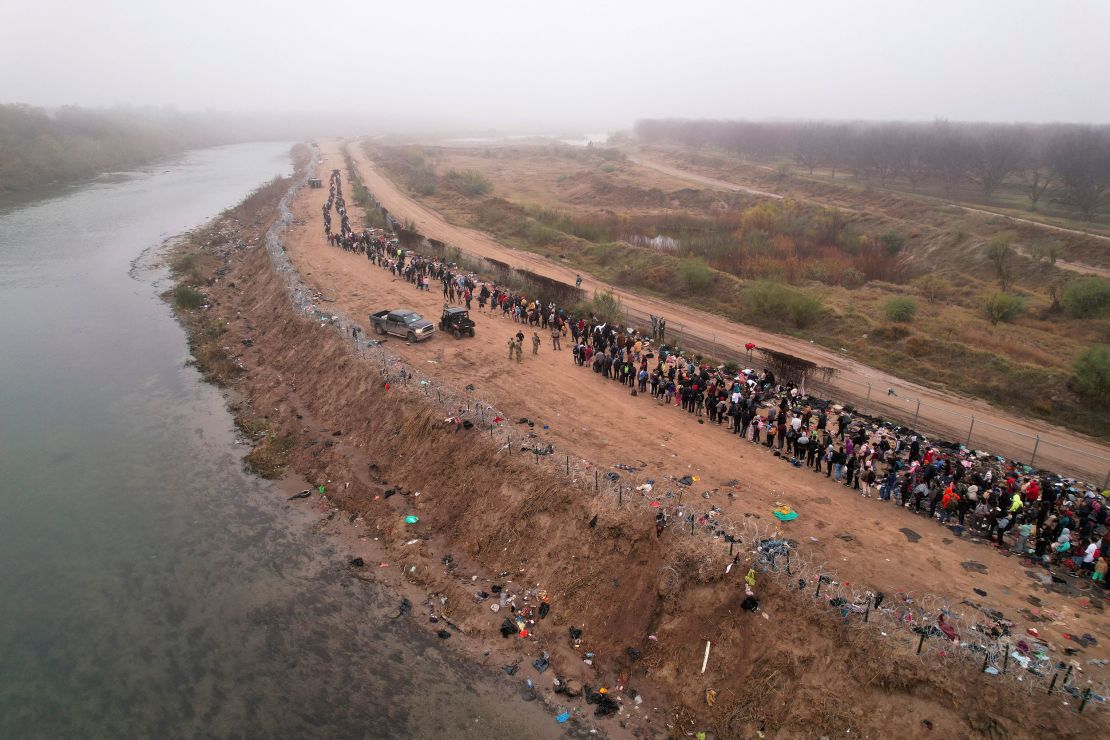Senior US officials held a?“very productive meeting”?with their Mexican counterparts Wednesday, Secretary of Homeland Security Alejandro Mayorkas said, as Washington seeks help from Mexico City to drive down southern border crossings that have placed increasing pressure on President Joe Biden.
“The regional challenge of migration requires regional solutions and we appreciate Mexico’s commitment to continue its efforts alongside us and with others,” Mayorkas wrote on X, formerly Twitter, following a bilateral meeting also attended by Secretary of State Antony Blinken and White House Homeland Security adviser Liz Sherwood-Randall.
Officials from both countries said the talks went well, though initial statements following the meeting were somewhat light on details.
“As we made clear in Mexico City today, we are committed to partnering with Mexico to address our shared challenges, including managing unprecedented irregular migration in the region, reopening key ports of entry, and combating illicit fentanyl and other synthetic drugs,” Blinken said in a post?on X.
In a post on X, Mexican President Andres Manuel Lopez Obrador said “important agreements were reached for the benefit of our people and nations” during the talks, without giving details. “Now more than ever, a good neighbor policy is essential,” he added.
Immigration has been a political vulnerability for Biden amid fierce criticism from Republicans and some members of his own party over the situation at the US-Mexico border.
This month, the issue fell at the center of the president’s foreign policy agenda, as the White House lobbied for aid to Ukraine and Israel amid their war efforts. Lack of consensus over border policy changes ultimately kept Biden from clinching billions of dollars in funds for Ukraine, Israel and the border before the end of the year.
Homeland Security officials have in recent months discussed a range of ways Mexico can help drive down numbers at the US border, including moving migrants south, controlling the railways used by migrants to move north, and providing incentives to not journey to the border, like visas, to remain in the country and avoid migrating irregularly.
In January, Biden met with Lopez Obrador in Mexico City for the North American Leaders’ Summit, where, along with Canadian Prime Minister Justin Trudeau, they addressed migratory flows in the region.
Nearly a year later – and despite a series of measures aimed at deterring irregular migration – the record number of migrants moving across the Western Hemisphere remains a pressing challenge for the US and Mexico.

What was discussed
The number of migrants presently traveling in a caravan toward the US southern border has dropped as migrants have dispersed to approximately 3,000, according to estimates from the UN refugee agency shared with CNN.
And following the meeting Wednesday, senior administration officials said they had seen “in recent days a pretty significant reduction in border crossings.”
According to senior administration officials, Mexico shared plans in the talks to crack down on migrant smugglers.
Mexico has also taken a leadership role on “conducting humane border management, including repatriations,” a senior administration official said, adding that more repatriations were conducted this year than ever.
“(Mexico) came prepared to share a plan with us on how they were taking the work that they are already doing,” a senior administration official said. “Enforcement actions are building on that. That was really aligned with the things that we’ve been focused on as well. Things like the need to really crack down on the smugglers that are putting migrants on buses, putting migrants on trains. We’ve seen that really contribute to the increase that we’ve seen at the border and just in recent weeks.”?
Mexico’s Secretary of Foreign Affairs Alicia Barcena described the talks as “very good.”
The top Mexican diplomat told reporters the discussions also covered the importance of the economic relationship between the two countries and the root causes of migration, such as poverty, inequality, violence and family reunification, according to a recording provided to CNN by Mexico’s Foreign Ministry.

Limited resources
Migrants have been trying to pressure Mexican authorities to provide documents, which have previously allowed people crossing into Mexico to move throughout the country.
The lack of papers appears to have factored into migrants’ decision, including the ones who might have wanted to file an asylum claim or to stay in Mexico, to head to the US — fueling the current caravan moving through Mexico, according to interviews on the ground by non-governmental organizations.
Migration often ebbs and flows, and in recent weeks, a new surge of migrants fleeing deteriorating conditions at home has overwhelmed already stretched federal and state resources. Former and current Homeland Security officials have warned that the border is nearing a “breaking point.”
Border authorities apprehended around 6,000 migrants along the US-Mexico border on Tuesday, marking a drop from previous days, according to a Homeland Security official.
Earlier this month, the seven-day-average hovered around 9,600 encounters, a jump from late November when that average stood at 6,800. The latest figures reflect some relief for US border authorities, though officials are still bracing for the days to come, chalking up the drop, in part, to the holidays.
Last week, Biden called his Mexican counterpart as the situation at the US southern border worsened. During the call, the two leaders agreed that additional enforcement actions were “urgently needed” so key ports of entry, which had been suspended to redirect personnel to help process migrants, could be reopened.
The US has historically leaned on Mexico to stem the flow of migrants journeying to the US southern border. But Mexico, like the US, faces similar difficulties as the number of migrants crossing into its country overwhelms its limited resources.
“The Mexicans still have relatively limited capacity,” said Earl Anthony Wayne, former US ambassador to Mexico and public policy fellow at the Wilson Center.
“Their immigration force is underfunded and small. Also, they use the National Guard occasionally to stop people but that’s only good for stopping people for short periods of time and hasn’t seemed to hold up very well. And you still have networks of smugglers,” he added.
Mexican officials are currently contending with thousands of migrants who left Tapachula, located in southern Mexico, on Sunday, making a long trek by foot toward the United States.
Many of the migrants are from Central and South America as well as the Caribbean, Cuba, and Haiti.
Caravans, like the one that departed over the weekend, often splinter in the weeks it takes to get to the US southern border, so it’s unclear how many migrants will arrive to the US-Mexico border.

The number of migrants arriving has also been difficult?for?US authorities?to manage because there isn’t enough detention space or repatriation flights for those who don’t qualify for asylum.
Already in northern Mexico,?more than 11,000 migrants continue to wait in shelters and camps to cross into the United States, according to community leaders. Many of those migrants are hoping to enter the US through legal pathways established by the Biden administration,?such as the CBP One app, which automates scheduling appointments to claim asylum with border authorities,?they said.
This story has been updated with additional information.
CNN’s Rashard Rose contributed to this report




